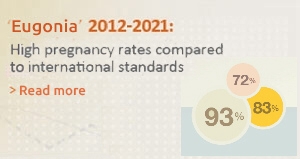The advantages of the antagonist protocol
It has been quite some time that the focus of the pharmaceutical companies that specialize in the production of fertility treatment drugs has shifted towards the production of drugs that could provide immediate suppression of LH and quick reversibility of that effect. GnRH antagonists met these specifications, although their safety and efficacy had to be proven in everyday clinical practice.
Nowadays, following numerous published studies and metanalyses that followed the first five multicentre phase III studies (2000-2001), we can say that antagonist protocols are patient friendly because:
- They have fewer injections
- smaller treatment duration (at least 12-15 days less when compared to the long protocol)
- smaller gonadotropin dosage in total
- less side effects (hot flashes, night sweats, nervousness, insomnia etc.)
- smaller chance of OHSS (statistically significant)
- Are suitable for modified natural cycles (M.N.C.)
- Are suitable for the application of mild stimulation protocols
Antagonist protocols demand a long learning curve and keeping up to date with all the latest studies, which could explain their initial smaller acceptance by the international scientific community.
The scientific team of Eugonia has proven its everyday knowledge and experience in the antagonist protocols, with original studies published in internationally accepted scientific journals. The effort of the scientific team of Eugonia is internationally recognised as a significant contribution to the assisted reproduction field.
Application of the antagonist protocol
In this protocol, gonadotrophic stimulation begins on the 2nd or 3rd day of the cycle, while the downregulation using the antagonist GnRH analogue follows. The duration of the antagonist protocol is approximately 12-15 days.
In the gonadotropin and antagonist protocol, the ovary receives two consecutive stimulation signals: initially from the increased endogenous FSH in the beginning of the cycle, and then from the exogenous injected gonadotropins. This means that follicle recruitment does not cease from the normally increased endogenous gonadotropins at the beginning of the cycle and that the gonadotropins administered from the beginning of the cycle reinforce follicle recruitment.
The antagonist administration can start either blindly on the 6th or the 1st day of stimulation with gonadotrophins (fixed antagonist protocol), or based on ultrasound and hormone criteria (flexible antagonist protocol).
The contribution of Eugonia to the antagonist protocol
The scientific team of Eugonia has published numerous studies on women undergoing assisted reproduction using the antagonist protocol in internationally renowned scientific journals. These are:
Women with polycystic ovarian syndrome
Comparison of long versus flexible antagonist protocol
Our study is the largest one internationally. It is a randomized prospective study that compares long with flexible GnRH antagonist protocol.
The results show that pregnancy rates are similar in both protocols and there is also a significant reduction (by 20%) of severe ovarian hyperstimulation syndrome when the antagonist protocol is used.
The antagonist protocol is suggested as a protocol of choice for women with polycystic ovaries. The conclusions of this study are adopted by independent editors of international organizations (Faculty of 1000 Medicine) and are honorary selected in "Editor's choice" by Professor Andre Van Steirteghem, who is the editor of scientific journal Human Reproduction.
The flattering comment that the suggested protocol can change the routine clinical practice refers to the finding that the flexible antagonist protocol is the safest protocol in women with polycystic ovaries without reducing their pregnancy rates.
See 1000 Medicine
See Editors choice
See our publication
Comparison of long versus antagonist protocol (D1)
In this study, the long protocol is compared with an alternative antagonist protocol. In this antagonist protocol, the first day of antagonist administration is on the 1st day of stimulation instead of the standard day 6 of stimulation./p>
In this original randomized prospective study the hormone levels are examined, along with the follicle development and the differences between the two protocols are highlighted. The study shows the differences in the hormonal environment during the stimulation and that the fastest follicle development happens with the antagonist protocol. This study has a great theoretical interest in the effort of optimizing the antagonist protocols/p>
The results show similar pregnancy rates for both protocols and reduced length of stimulation duration and reduced appearance of OHSS with the antagonist protocol.
See our publication
Poor responders
In our study on poor responders we achieved significantly higher ongoing pregnancy rates using the flexible antagonist protocol, as compared to the short agonist protocol. This is by far the largest randomized controlled trial in the literature on poor responder patients undergoing IVF treatment, and has been included in several meta-analyses.
See our publication
Antagonist administration according to individually selected criteria increases pregnancy rates
When antagonist administration is applied according to individually selected criteria, this correlates with statistically increased pregnancy rates. A relevant study of the Eugonia scientific team was recently published in scientific journal of the European Society of Human Reproduction and Embryology (ESHRE) titled «In a flexible antagonist protocol earlier, criteria-based initiation of GnRH antagonist is associated with increased pregnancy rates in ΙVF» (Lainas et al., Hum Reprod 2005;20(9):2426-2433).
See our publication
The administration of antagonist in the luteal phase can manage already established severe OHSS
See our publications
Live births after management of severe OHSS by GnRH antagonist administration in the luteal phase.
Management of severe OHSS using GnRH antagonist and blastocyst cryopreservation in PCOS patients treated with long protocol.
Management of severe early ovarian hyperstimulation syndrome by re-initiation of GnRH antagonist.






























